It is a commonly held belief that children need to form social skills before they can develop friendships. Child development experts tell us that the opposite is actually true.
Friendships begin to develop around 18 months, when toddlers are discovering their own sense of self. As a result, when a child finds another child who seems to be interested in the same things, a special bond can emerge. Of course, such bonds can be short-lived because of the limits of empathy, for example, but they form the basis for friend-making skills.
 If you are the parent of a shy or introverted child you may worry that your son or daughter may not be able to make friends since he or she is uncomfortable in social situations. It is important to realize that there is nothing wrong with shy children, they simply have a different temperament. While you can’t make a child not be shy, you can help that child feel more comfortable interacting with other people, including their peers.
If you are the parent of a shy or introverted child you may worry that your son or daughter may not be able to make friends since he or she is uncomfortable in social situations. It is important to realize that there is nothing wrong with shy children, they simply have a different temperament. While you can’t make a child not be shy, you can help that child feel more comfortable interacting with other people, including their peers.
It is natural that you want your child to be confident and immediately at ease but some children take more time to warm up in social situations, making establishing friendships more difficult. The key is to work with your child’s natural temperament instead of against it.
What follows are some ways to make sure that you are doing all you can to make your toddler or preschooler comfortable in social situations without causing unnecessary distress.
- Give it time. Don’t throw your toddler into situations before they are ready. For example, visit a new childcare center with your child and stay there with them before they go solo.
- Praise them. If you notice your child talking to another child or exploring their surroundings, let them know you are proud of them.
- Model friendly behavior. Say hello to people you meet and be friendly. Remember, children are always watching how you react in situations and will model your behavior.
- Don’t make it a big deal. If your child is upset and clings to you, being overly comforting can send the message that they are correct in being afraid. Instead, no matter how much you are struggling inside, let your child know that you are confident things will be just fine.
- Avoid labels. If your child is resisting talking to others, avoid telling people he or she is shy in front of your child. Instead say that your child needs a little time to warm up. Your child will appreciate knowing that you are their advocate.
- Avoid comparisons. Every child is different. Comments like, “Why can’t you be more like your sister?” will cause more harm than good. Instead, focus on helping your child become the best version of his or herself.
In the end, don’t project your own social expectations on your children. Some children prefer independent play while others want to be in the middle of large groups. If your child, no matter what their age, is happy with the status of their friendships, you should be, too.

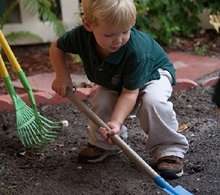 Some of the best memories your child will make are running around, playing outdoors at Preschool, and being active in the amazing summer weather. However, all this running and physical activity in the heat of the day can put children, and adults, at risk for heat stroke, dehydration, harsh sunburns and other related types of complications.
Some of the best memories your child will make are running around, playing outdoors at Preschool, and being active in the amazing summer weather. However, all this running and physical activity in the heat of the day can put children, and adults, at risk for heat stroke, dehydration, harsh sunburns and other related types of complications.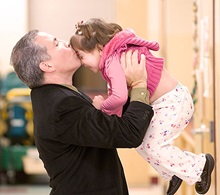 One of the most stressful parts of being a working parent is having a healthy work/family balance. It’s hard for a busy parent not to wonder if they truly are making enough time to spend with family. A quality childcare center will acknowledge that being away from your child is extremely difficult but that doesn’t mean you are a bad parent.
One of the most stressful parts of being a working parent is having a healthy work/family balance. It’s hard for a busy parent not to wonder if they truly are making enough time to spend with family. A quality childcare center will acknowledge that being away from your child is extremely difficult but that doesn’t mean you are a bad parent. As parents and teachers we recognize the importance that reading skills play in our personal and professional lives. We read on a daily basis, and as a matter of fact you are reading as we speak. Once your child hits the appropriate development level to being reading, putting together a reading plan can make later learning a much easier process.
As parents and teachers we recognize the importance that reading skills play in our personal and professional lives. We read on a daily basis, and as a matter of fact you are reading as we speak. Once your child hits the appropriate development level to being reading, putting together a reading plan can make later learning a much easier process.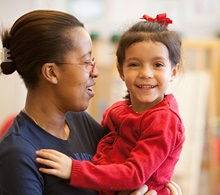 What is the right age to start your child in preschool in Omaha and Elkhorn, NE? You may worry about starting him too early when he’s not quite ready to grasp all of the new concepts that are introduced in a more structured, quality childcare setting. Or on the other hand, you worry about starting him to late and not giving him enough time to develop the skills necessary to succeed in Kindergarten.
What is the right age to start your child in preschool in Omaha and Elkhorn, NE? You may worry about starting him too early when he’s not quite ready to grasp all of the new concepts that are introduced in a more structured, quality childcare setting. Or on the other hand, you worry about starting him to late and not giving him enough time to develop the skills necessary to succeed in Kindergarten. Are there benefits to teaching your child baby sign language? Although some studies point to increased intellectual development, the primary benefit of using baby sign language is decreased frustration for both you, your daycare provider, and your baby. Babies can use sign language to communicate their wants and needs long before they begin using words.
Are there benefits to teaching your child baby sign language? Although some studies point to increased intellectual development, the primary benefit of using baby sign language is decreased frustration for both you, your daycare provider, and your baby. Babies can use sign language to communicate their wants and needs long before they begin using words. 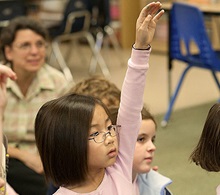 These days, parents have so many different options when it comes to childcare. Parents can choose from childcare centers, home care providers, nannies, non-profit programs, state-funded programs, and so many others. There is a variety of titles for these services, including childcare, daycare, preschool, or early childhood education. Are these terms interchangeable? And how do they differ in terms of quality?
These days, parents have so many different options when it comes to childcare. Parents can choose from childcare centers, home care providers, nannies, non-profit programs, state-funded programs, and so many others. There is a variety of titles for these services, including childcare, daycare, preschool, or early childhood education. Are these terms interchangeable? And how do they differ in terms of quality?
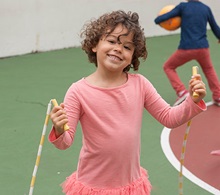 Child Development through Structured & Unstructured Play
Child Development through Structured & Unstructured Play